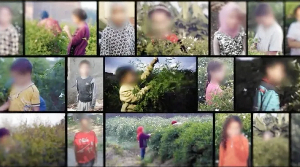Children have picked ingredients used by suppliers to two major beauty companies, the BBC can reveal.
A BBC investigation into last summer's perfume supply chains found jasmine used by Lancôme and Aerin Beauty's suppliers was picked by minors.
All luxury perfume brands claim to have zero tolerance for child labour.
L'Oréal, Lancôme's owner, said it was committed to respecting human rights. Estée Lauder, Aerin Beauty's owner, said it had contacted its suppliers.
The jasmine used in Lancôme Idôle L'Intense - and Ikat Jasmine and Limone Di Sicilia for Aerin Beauty - comes from Egypt, which produces about half the world's supply of jasmine flowers - a key perfume ingredient.
Industry insiders told us the handful of companies that own many luxury brands are squeezing budgets, resulting in very low pay. Egyptian jasmine pickers say this forces them to involve their children.
And we have discovered the auditing systems the perfume industry uses to check on supply chains are deeply flawed.
The UN Special Rapporteur on contemporary forms of slavery, Tomoya Obokata, said he was disturbed by the BBC's evidence, which includes undercover filming in Egyptian jasmine fields during last year's picking season.
"On paper, they [the industry] are promising so many good things, like supply chain transparency and the fight against child labour. Looking at this footage, they are not doing things that they promised to do."
Heba - who lives in a village in the district of Gharbia, the heart of Egypt's jasmine region - wakes her family at 03:00 to begin picking the flowers before the sun's heat damages them.
Heba says she needs her four children - aged from 5 to 15 - to help. Like most jasmine pickers in Egypt, she is what is known as an "independent picker" and works on a smallholder farm. The more she and her children can pick, the more they earn.
On the night we filmed her, she and her children managed to pick 1.5kg of jasmine flowers. After paying a third of her earnings to the land owner, she was left with roughly US$1.5 [£1.18] for that night's work.
This is worth less than ever before, given inflation in Egypt is at an all-time high, and pickers are often living below the poverty line.
Heba's 10-year-old daughter Basmalla has also been diagnosed with a severe eye allergy. At a medical consultation we attended with her, the doctor told her that her vision would be affected if she continued jasmine picking without treating the inflammation.
Once the jasmine has been picked and weighed, it is transferred via collection points to one of several local factories that extract oil from the flowers - the main three being A Fakhry and Co, Hashem Brothers, and Machalico. Each year, it is the factories that set the price for the jasmine picked by people like Heba.
It is difficult to say exactly how many of the 30,000 people involved in Egypt's jasmine industry are children. But during the summer of 2023, the BBC filmed across this region and spoke to many residents who told us the low price for jasmine meant they needed to include their children in their work.
We witnessed that, at four different locations, a significant number of pickers working on smallholder farms - which supply the main factories - were children under the age of 15. Multiple sources also told us that there were children working on farms directly owned by the Machalico factory, so we went undercover to film there and found pickers who told us their ages ranged from 12 to 14.
It is illegal for anyone under the age of 15 to work in Egypt between the hours of 19:00 and 07:00.
The factories export the jasmine oil to international fragrance houses where the perfumes are created. Givaudan, based in Switzerland is one of the largest and has a longstanding relationship with A Fakhry and Co.
Africa News of Tuesday, 28 May 2024
Source: bbc.com

















